In the thrilling roller coaster ride that is digital marketing, there's one carousel that never stops spinning: the powerful whirl of customer reviews. They aren't just a pat on the back or a shrug of indifference for your product or service. They've grown into titanic forces that shape your brand's reputation, swing the pendulum of purchasing choices, and sculpt the contours of customer loyalty.
When we stroll into the B2B arena, reviews get even more muscular, flexing their influence on long-term contracts and shaping business ties. So, honing your ability to manage and charm those precious product reviews isn't just a nice-to-have skill—it's the golden ticket to boosting your product's credibility, stretching your customer family, and pumping up those revenue muscles.
But here's the twist: asking for reviews can feel like solving a Rubik's cube—confusing, tricky, and a tad frustrating. So, how do you ask for product reviews without sounding like a pushy salesperson while still keeping your genuine smile on? That's the million-dollar question we're gearing up to answer in this article.
We'll discuss practical strategies and crafty techniques geared toward helping you ask for, receive, and spin customer feedback into gold. Because a happy customer is a loyal customer. Let's get started!
//[inject:ad-multi-automations]
Importance of product reviews
Product reviews are much more than just star ratings or customer testimonials. They play a pivotal role in shaping how your business and products are perceived in the market. Here's why:
Building trust
Did you know that 88% of consumers trust online reviews as much as personal recommendations? When customers share their experiences and highlight the value of your product, it encourages others to trust your brand, forming a vital step in converting prospects into loyal customers.
Improving SEO
Customer reviews don't just earn consumer trust—they also help your business get found on search engines. Search engines like Google love fresh, unique content, and user-generated reviews provide just that. You're feeding search engines new, keyword-rich content by frequently updating product descriptions and adding user reviews.
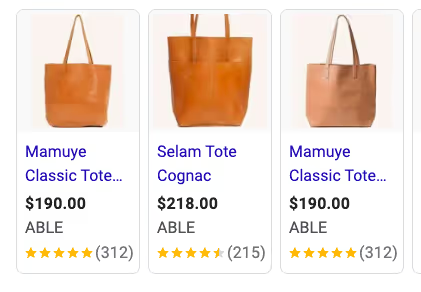
This helps improve your organic search rankings, making your product more visible to potential customers. Not to mention, Google reviews make it easy for potential customers to see positive feedback almost instantly.
Enhancing consumer engagement
Reviews also serve as a platform for consumer engagement. By responding to reviews, positive or negative, you demonstrate your brand's commitment to customer satisfaction and open a dialogue with your customers.

It shows you care about the customer experience and you're appreciative of the people who write reviews. This personalizes the shopping experience and strengthens your relationship with customers, improving their overall satisfaction and likelihood to recommend your product to others.
Increasing sales
Finally, and perhaps most obviously, positive reviews directly correlate with increased sales. A study from the Spiegel Research Center found that products with five reviews can increase the likelihood of purchase by 270%. This shows the profound impact of customer feedback on driving sales. Positive reviews can be the most persuasive form of marketing.
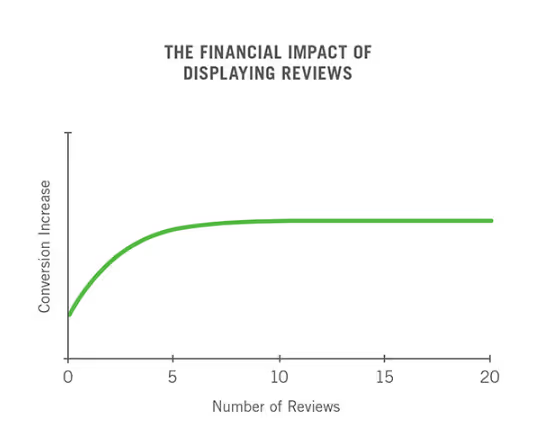
Tips for asking for product reviews
Collecting reviews can be as important as delivering quality products or services. The following tips can guide you in successfully soliciting customer feedback:
Timing
Choosing the right time to ask for a review is crucial. Asking too soon may not yield a meaningful response, as the customer may have yet to experience the product or service fully. On the other hand, asking too late may result in missed opportunities as the experience may no longer be fresh in the customer's mind. A good practice is to ask for a review 7-12 days after your customers have received your product. You can automate this by using triggered emails to send an email or SMS request a week or two after product delivery.
Simplicity
The easier you make the review process, the more likely customers are to provide feedback. Reducing friction points and making the review process as straightforward as possible is essential. This could include providing a direct link to the review page or using review platforms that offer an easy-to-use interface. The key is to make it convenient for the customer to share their experience.
Incentives
While obtaining genuine and unbiased feedback is crucial, a little motivation can go a long way. Offering incentives, like discount codes, future purchase benefits, or entry into a prize draw, can encourage customers to leave reviews. However, ensuring these incentives don't sway the customer's honesty in providing feedback is vital.
Personalization
When reaching out for reviews, personalization is key. A generic request for a review is less likely to resonate than one that addresses the customer by name and refers to the specific product or service they purchased. Customers are more likely to engage and provide feedback by making the request personal and relevant. Using data to personalize the customer experience is key to providing an experience to remember (and write a review about!).
Most common types of product reviews and review request templates to ask for them
Every business has unique touchpoints with its customers, which can be optimal opportunities to solicit reviews. These review request email examples and easy-to-use sample templates make it easy to ask for reviews:
Post-purchase email
Once a customer makes a purchase, it's a great opportunity to reach out to them for feedback.
Here's an example of a post-purchase review request:
Subject: Thanks for your purchase - we'd love your feedback!
Hi [Customer Name],
Thanks for choosing [Your Product]. We hope it meets and exceeds your expectations! We're always striving to improve and provide the best for our customers, and your feedback is a crucial part of that.
We'd appreciate it if you could take a few minutes to write a review about your experience with [Your Product]. Your insights will help not only us but also other customers like you.
[Direct Link to Review Page]
Thanks in advance for your time.
Best,
[Your Name]
Post-delivery email
After delivery, when the customer has had a chance to use the product, is another excellent opportunity to ask for a review:
Subject: How are you enjoying [Your Product]?
Hey [Customer Name],
We hope you're enjoying your new [Your Product]! Tell us all about it and upload some photos to show off your look. As a thanks for your honest opinion, we’ll send you a code for 15% off your next order!
[Direct Link to Review Page]
Thank you for your time and support!
Kind regards,
[Your Name]
SMS request
If you've opted for SMS as a mode of communication, keep your message short and friendly:
[Customer Name], we hope you're loving your new [Your Product]! We want to hear all about it; share your honest feedback with us. [Shortened Link to Review Page] Thanks!
Testimonial reviews
These are detailed reviews usually obtained from satisfied customers. They're perfect for your website or marketing materials:
Hi [Customer Name],
We're thrilled you've had a positive experience with [Your Product]. Since you’re a [brand name] aficionado, we were wondering if you could write a brief testimonial about your experience that we could share with friends in our community.
Thank you for considering!
Best,
[Your Name]
Video reviews
For a more engaging and impactful review, you might consider asking for a video review:
Subject: Show us your [Your Product] experience!
Hi [Customer Name],
We're so happy you chose [Your Product]. We'd love to see it in action and hear about your experiences. Would you be willing to share a short video review to show how you rock [brand name]? It's a fun and engaging way to share your thoughts, and it helps our community make informed decisions.
Thanks for considering, and let us know if you have any questions!
Best,
[Your Name]
Remember, the key to soliciting reviews successfully is to make the process easy and comfortable for the customer, maintaining a genuine and appreciative tone throughout.
Common mistakes to avoid when asking for online reviews
Asking for online reviews is a delicate process, and it's easy to stumble. Here are a few common missteps to avoid when seeking out customer feedback:
- Being too pushy: Bombarding customers with multiple requests or using language that feels desperate can turn customers off and potentially damage your relationship with them. Instead, focus on creating a respectful, appreciative request acknowledging their time and effort.
- Ignoring negative reviews: Negative reviews can feel like a blow but also provide valuable growth opportunities. Ignoring or deleting negative feedback robs you of the chance to improve and comes across poorly to customers. It's important to address both positive and negative reviews professionally and promptly, demonstrating your commitment to customer satisfaction and continuous improvement. Surprisingly, negative reviews can play a rather positive role in bolstering your credibility. In fact, small businesses sporting a star rating of 4.0 to 4.5 see an increase in their annual revenue by 28%.
- Violating platforms' policies: Each review platform has policies and guidelines about soliciting reviews. For example, Amazon prohibits incentivizing reviews, and Google insists reviews must be unbiased and genuine. Violating these rules can result in penalties and damage your brand's reputation. Always ensure you're familiar with and respect the guidelines of your platforms and review sites.
Avoiding these common mistakes can significantly improve the effectiveness of your review solicitation efforts. You can enhance customer relationships and bolster your product's online presence by striking the right tone, appreciating all feedback, and respecting platform rules.
Strategies to leverage Sendlane's review capabilities
Sendlane's cutting-edge features provide several strategic avenues to facilitate and enhance your review collection process. Here's how:
Automation
With Sendlane's latest automation capabilities, you can send review requests at the perfect time without lifting a finger. These automations can be set based on the earlier timing—such as post-purchase or post-delivery—to ensure you're reaching out at the most opportune moment. You can also use this feature to send reminders to customers who haven't had a chance to leave a review yet.
Segmentation
Personalization is key in soliciting reviews, and Sendlane's segmentation capabilities can help you nail it. Segment your audience based on factors like purchase history, product type, or star rating to help you find your brand champions. By doing this, you'll make each customer feel recognized, increasing the likelihood of them leaving a review.
Leverage within email and on-site to sell more
Sendlane can also help you incorporate reviews into your email marketing and on-site content. Request customer reviews in your promotional emails or on product pages to drive customers to your site and help potential customers make informed decisions.
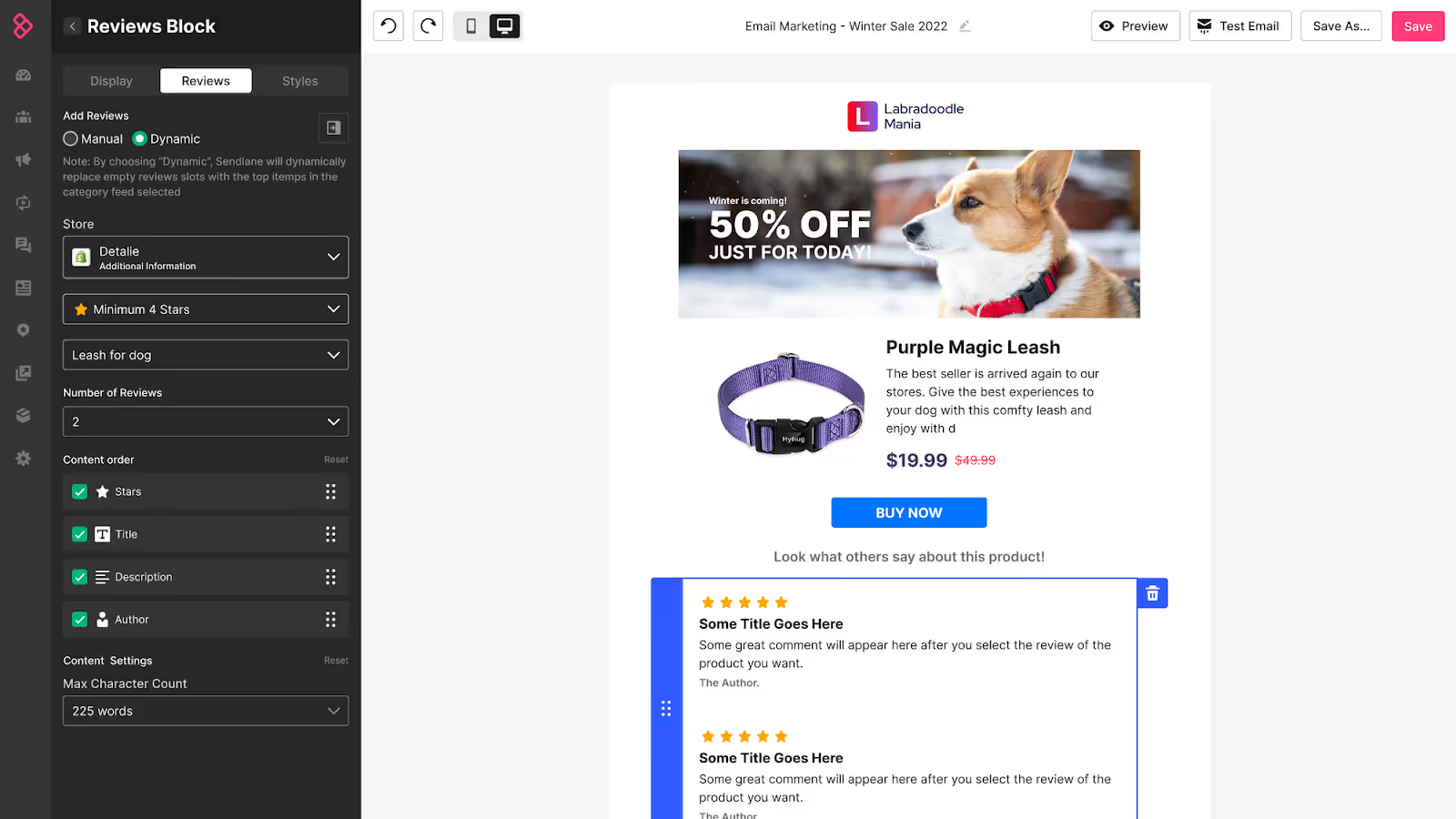
You can also create dedicated testimonial emails or pages on your website to further highlight positive reviews. All of this serves to build trust, engage customers, and, ultimately, drive more sales. The more you show off this feedback, the easier it will be to increase customer reviews in the future.
Analysis
Sendlane's analytics feature lets you understand how your review solicitation efforts perform. By analyzing open rates, click rates, and review submission rates, you can identify what's working and what isn't. Additionally, the reviews themselves can serve as a helpful source of customer feedback, highlighting areas of success or potential improvement for your business.
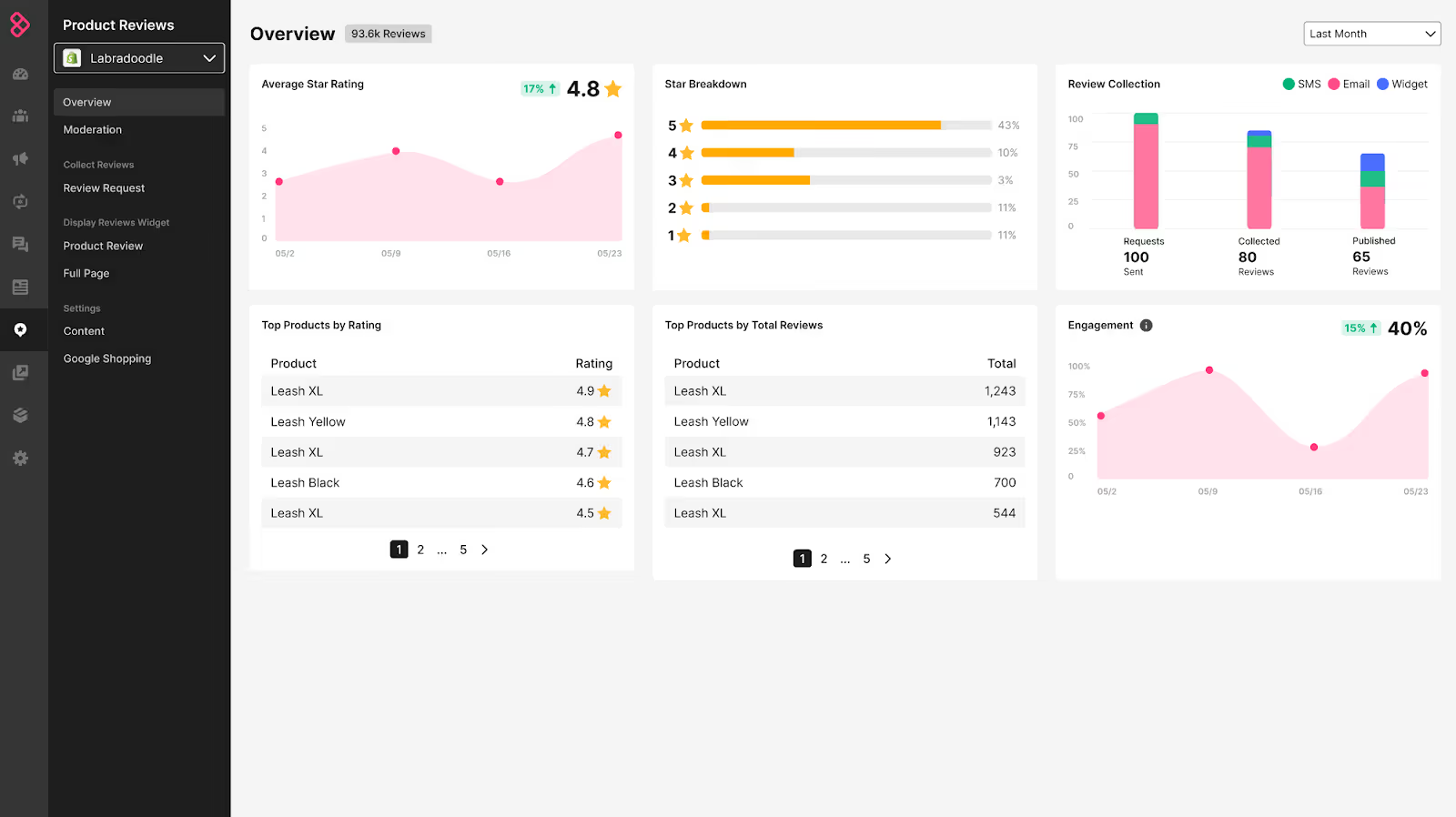
With Sendlane's powerful features, collecting, showcasing, and analyzing customer reviews becomes more streamlined than ever, helping you refine your marketing strategies and accelerate business growth.
Examples of successful product review requests
Target
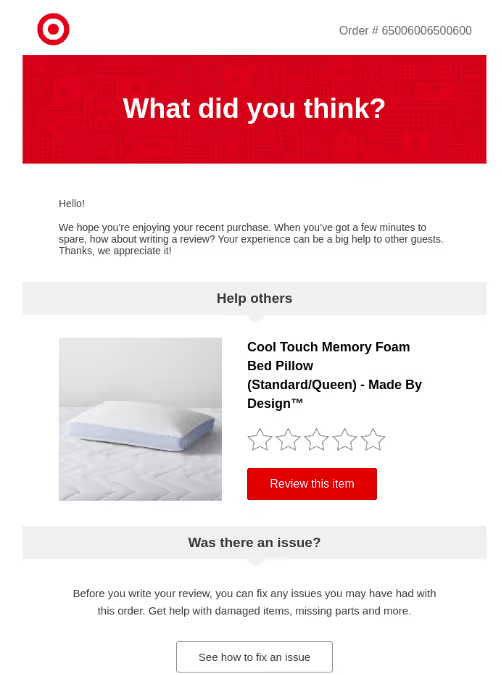
This email from Target is a great example of a product review email for a few key reasons:
- Reminds customer of purchase with an accompanying image: By including a visual reminder of the product, the email ensures the customer clearly remembers the purchase and creates a more engaging and personalized experience.
- Can review product right from the email: Convenience is key when asking for reviews, and this email makes it as easy as possible. The customer can click a link or a button in the email to leave a review, reducing friction and increasing the likelihood of following through.
- Provides the ability to rectify an issue before leaving a negative review: By offering the option to address any issues proactively, Target demonstrates its commitment to customer satisfaction. This can help prevent negative reviews and shows the company values its customers' experiences.
Vuori
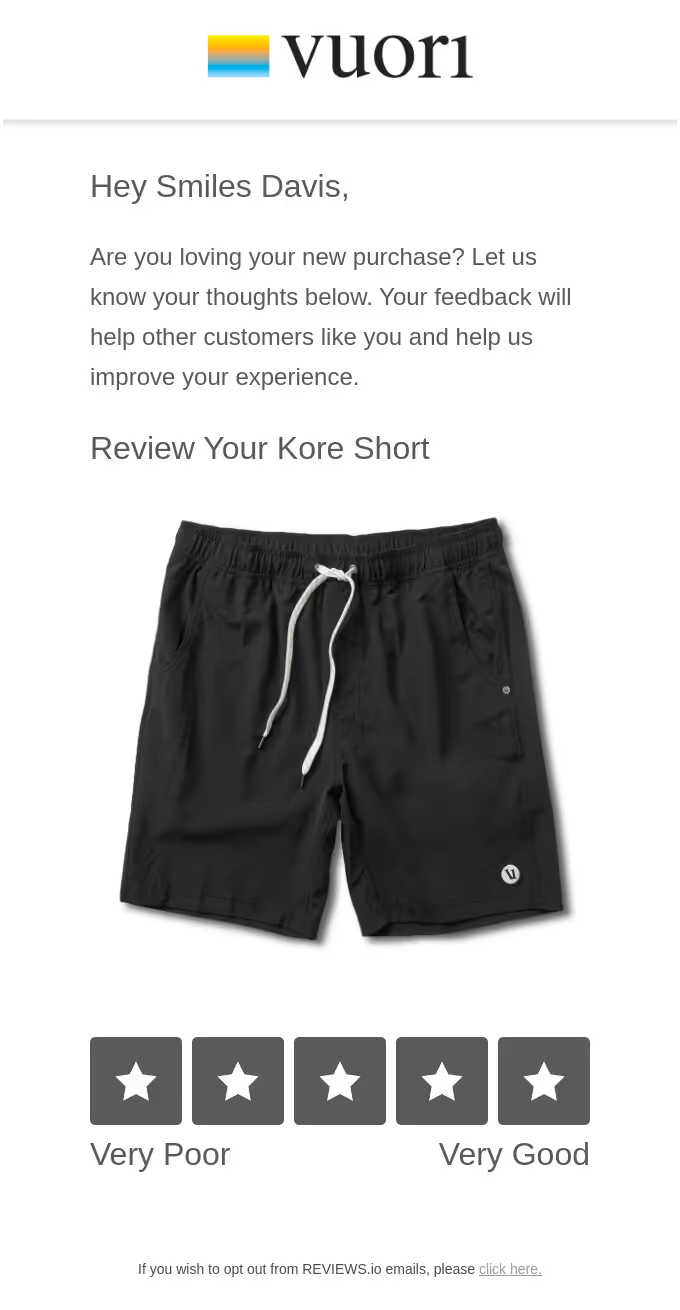
This email from vuori is an awesome example of a simple and effective way to ask for a review. Here's why:
- Friendly tone with an easy ask: The language used in the email is approachable and conversational, making the customer feel at ease. The request for a review isn't aggressive or pushy, but instead, it's presented as a simple, straightforward ask, increasing the likelihood of a response.
- Clear reminder of purchase: The email makes it easy for the customer to remember exactly what they purchased. This makes leaving a review even easier because your product will be top of mind and simple to rate.
- Rating scale makes it an easy lift: The inclusion of an easy-to-rate star scale that brings the customer directly to the review page once they select their star rating makes leaving a review extremely convenient for the customer. This seamless process eliminates potential barriers, encouraging more customers to share their feedback.
Casper
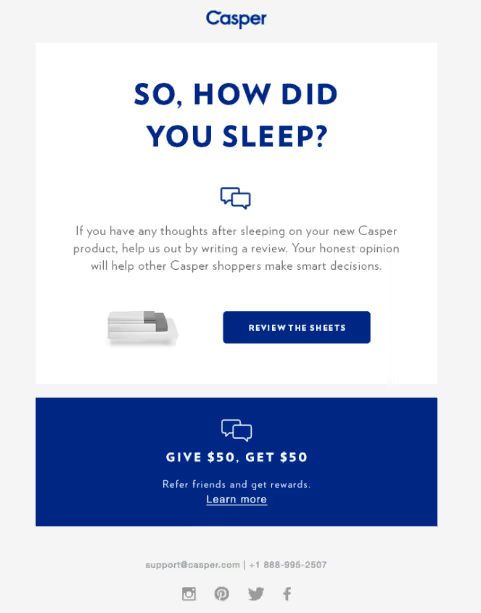
This product review email from Casper is an excellent example of rewarding the customer for a feedback request. Here's what makes this email stand out:
- Stresses honesty over perfect star rating: By emphasizing the importance of honest feedback over a flawless rating, Casper builds trust and makes customers feel more comfortable about sharing their true experiences. Feedback request emails like this one can lead to more authentic and valuable reviews.
- Offers a reward for leaving a review: Incentives can be a strong motivator, and Casper's offer of a reward for leaving a review is a compelling reason for customers to take action. It shows appreciation for the customer's time and effort in providing feedback.
- CTA button has the product name directly on it: The call-to-action (CTA) button is not only prominent but also personalized with the product's name. This serves as a visual reminder of the product and makes the CTA more specific and engaging, further enhancing the likelihood of customers leaving a review.
//[inject:ad-demo]
Increase your product reviews with Sendlane
Product reviews hold a goldmine of benefits for businesses, from building trust to boosting SEO, engaging customers, and driving sales. However, soliciting and effectively leveraging these reviews requires a nuanced approach respecting customers' experiences, time, and the platform’s rules.
By avoiding common missteps and implementing our tips, you'll be well on your way to mastering the art of requesting reviews. But why not make the journey even smoother?
With features like dynamic automation, segmentation, powerful analytics, and the ability to leverage reviews within emails and onsite, Sendlane makes the process of using reviews significantly more efficient and personalized. Sendlane empowers you to tailor review requests to each customer, automate the process, and analyze your efforts for continuous improvement.
Incorporate Sendlane into your marketing strategy and unlock the true potential of product reviews. Harness their power to enhance your product's reputation and visibility, fortify your relationships with customers, and drive your business's success to new heights.
Sign up for a free Sendlane trial now to get started!




%20(1).avif)




%20(1).avif)
%20(1).png)
.avif)


.avif)
.avif)


.avif)





.avif)



.avif)





.avif)


.avif)

.avif)
.avif)

.avif)
.avif)

.avif)

.avif)


.avif)
.avif)
%20(1).avif)
.avif)









.avif)











.avif)
.avif)

%20(1).avif)

%20(1).avif)



.avif)


























.avif)











































.avif)



.avif)




























.avif)



.avif)

.avif)

.avif)
.avif)


.avif)













.avif)

.avif)










.avif)












.avif)






































.avif)



.avif)

.avif)

.avif)
.avif)

.avif)
.avif)

.avif)

.avif)

.avif)
























